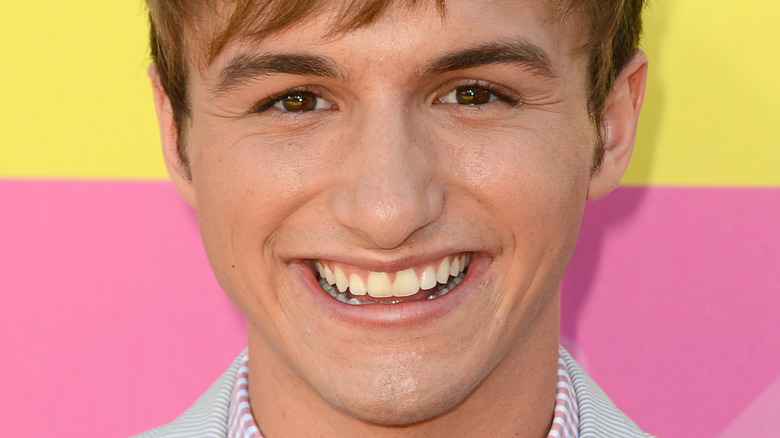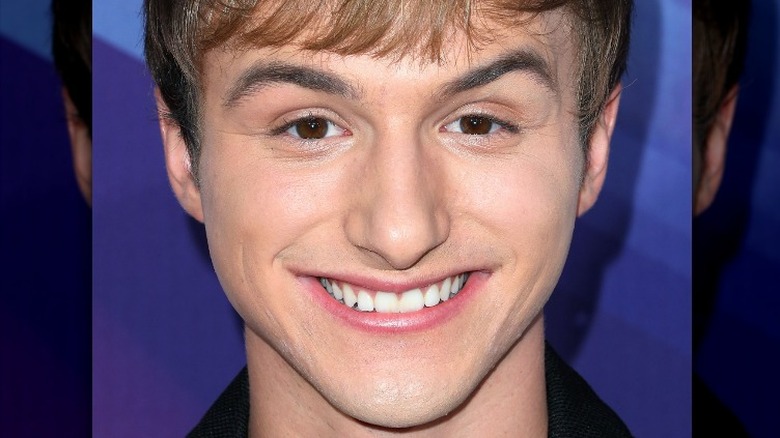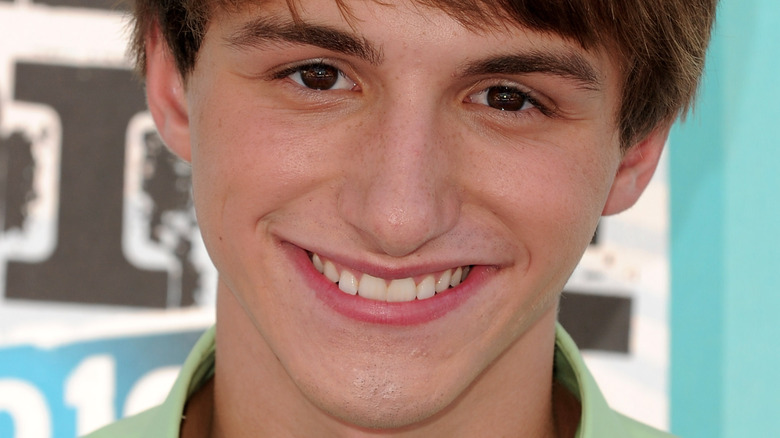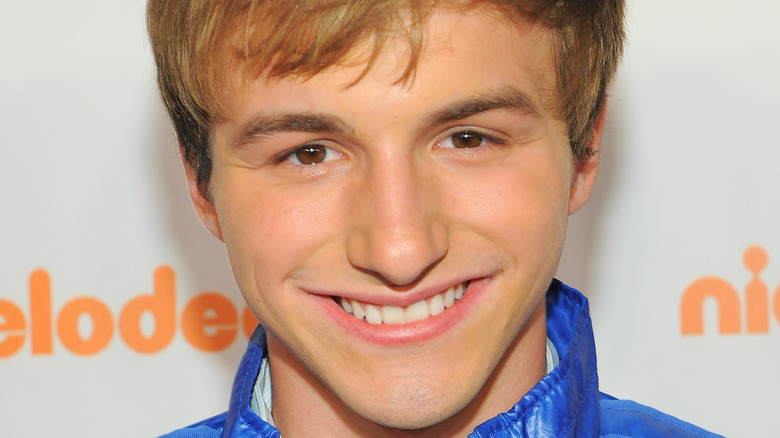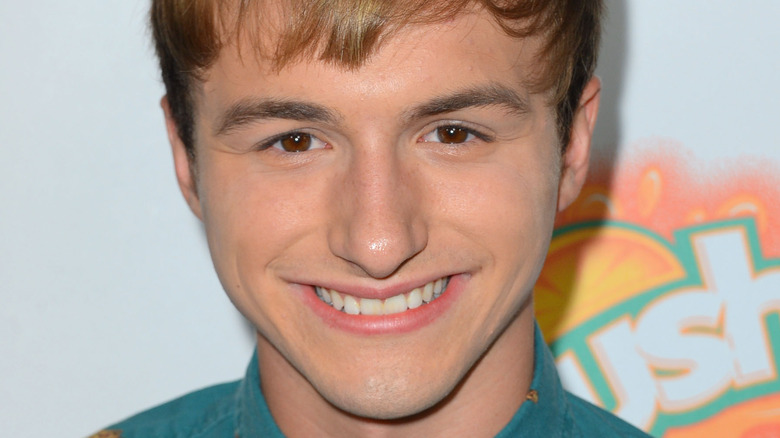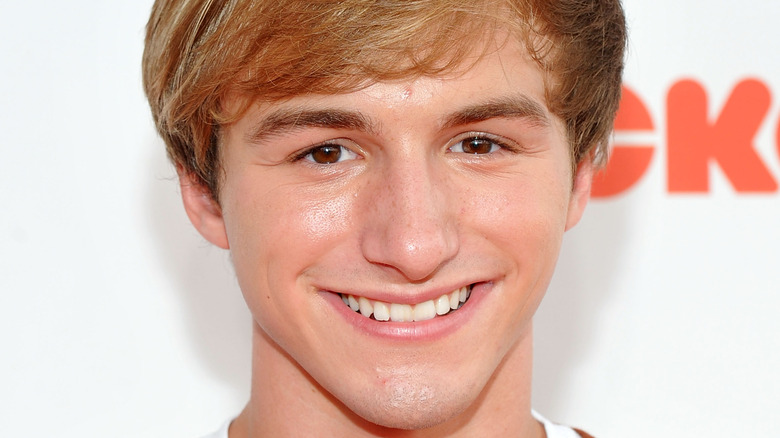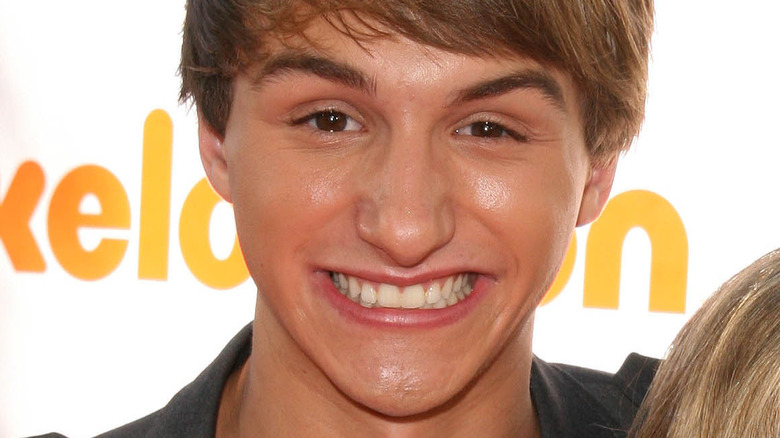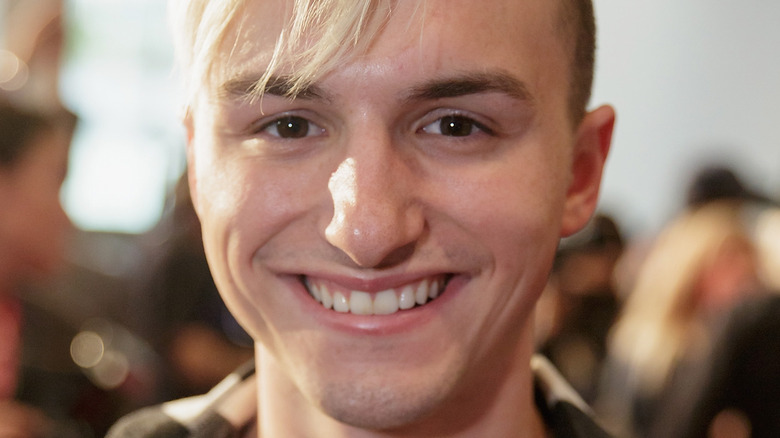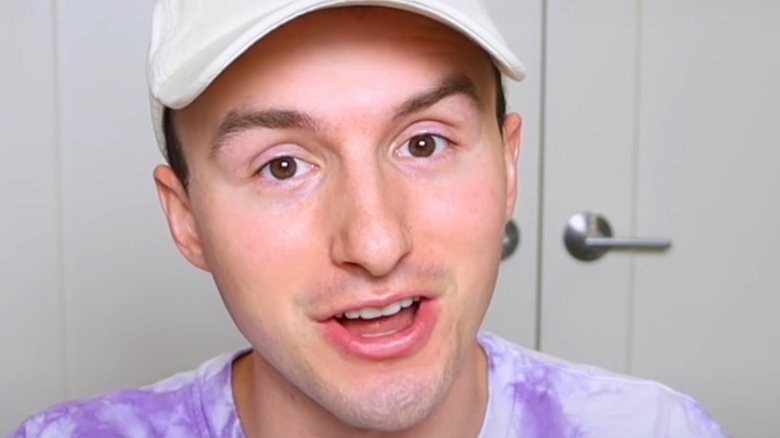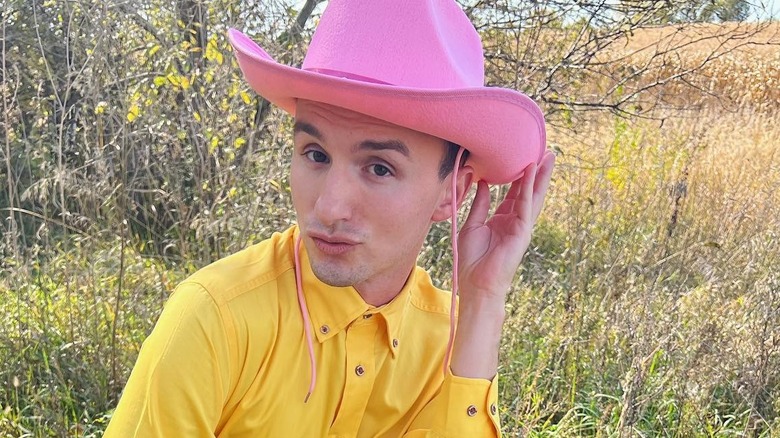Why Hollywood Won't Cast Lucas Cruikshank Anymore
As the shrill talent behind Fred Figglehorn — Nickelodeon's clanging mass of shrieking hilarity — it may not be much of a mystery as to why Hollywood won't cast Lucas Cruikshank anymore. To anyone over a certain age who bore witness to the character, the YouTube star-turned-cultural phenomenon was likely something they hoped to never come across again. But to a younger generation, Fred was about as funny as it got: A chaotic farce of a character who expressed all the over-energized, potent chagrin of childhood.
As reported by The Week, Cruikshank created the "cult character ... in his bedroom" as a teenager, and began posting webisodes about him on YouTube from 2006. Publishing videos during the platform's infancy, the performer managed to gain notoriety and a huge following before most people had started to see the potential of YouTube as a legitimate vehicle for content. In 2009, the star became the first to receive 1 million subscribers on the platform, "with close to 250 millions [sic] views on only 36 videos," the Los Angeles Times reported.
When Hollywood came knocking for what the publication called "a plucky farm kid with a camcorder," a Nickelodeon TV show and a trilogy of films about the internet's most divisive character were at the door for him. So what happened? Prepare your room for some hacking hyperactive cacophony and set the intensity of your voice changer machine to "earsplitting," because this is why Hollywood won't cast Lucas Cruikshank anymore. Oh my gammit!
People grew tired of Fred's niche appeal
The first step to understanding what happened to Lucas Cruikshank is to acknowledge just how obnoxious anyone over the age of 18 found Fred Figglehorn to be. On top of having a voice that The Sydney Morning Herald described as falling "somewhere between the sound of fingernails scratching a chalkboard and Pee-wee Herman on steroids," the character's situational comedy also revolved around obnoxious and sometimes gross pursuits, which only heightened his unappealing qualities.
In their review of "Fred: The Movie," Variety suggested that "prolonged exposure to such a deliberately irritating character could just as easily prove too much to handle," which made the character's "unfathomable appeal" something that may not have cultural endurance. At the time, Cruikshank argued that he understood how people "can't get past Fred's voice" for its "annoying" qualities during an interview with Forbes, but suggested people weren't giving the character a fair chance beyond that. "It's an acquired taste," he reasoned.
Indeed it was. And at some point, the kids who grew up loving Fred got to an age where they, too, lost interest in him. Apparently, so did Cruikshank. In 2020, the star explained in a video on his "Lucas" channel how, "towards the end" of the character, he was getting "a little annoyed" with playing Fred, and even "had to see a throat doctor ... from screaming so much" as the character.
The terrible legacy of Fred: The Movie
As a YouTube entity, Lucas Cruikshank's parent-torture-device of a character could be easily and safely contained within the padded cell of a private PC computer. The considerate ones may have also contained him within a set of headphones. But when the character was then transferred to a big screen, there was no escape — and the suffering of grown-ups everywhere was likely reflected in the audience's response to the film.
Newsweek reported that there were "mixed results" from "Fred: The Movie," the character's film debut. Though it "drew a big audience on Nickelodeon," it attracted dire reviews from film critics and "did poorly" at the box office overseas, where it inexplicably was given a theatrical release. The Guardian panned the film as being "unbelievably irritating" and "a waste of time," Express described it as "desperately dumb and irritating," and Empire mused that "a fun three minutes on YouTube makes for a [worthless] 80 minutes in a cinema. Avoid."
TV and movie moguls eager to cash in on Cruikshank's online popularity were met with a quandary: How could they profit off a property that parents were unlikely to pay to see with their kids? As Variety put it in their review, "Parents will want to be anywhere Fred's not." Worse still, the publication suggested the character's move from the internet to mainstream programming was a concern, stating, "Anyone worried about YouTube's potentially negative influence on television has reason to be absolutely horrified."
Fred's world was dark and off-putting
On top of Fred Figglehorn's incessant "shrieks, squeals, and babbles," which tortured adults — like the film critics at Variety — people were also left baffled by another element of the world Lucas Cruikshank created: Why was it so dark? Describing the "Fred" webisodes as "unexpectedly edgy," the Los Angeles Times chewed on the unexpected "range" of the actor behind the character. "Fred's mother is an alcoholic," they wrote. "Fred is full of rage and almost definitely ADHD; he has a tendency to forgo his meds."
In a video posted on his "Lucas" channel wherein he rewatched "Fred: The Movie," even Cruikshank acknowledged that things were a bit off about the character. Between having a father who he jokingly described as being physically "abusive" towards Fred — it was also John Cena's cinematic debut, folks! — the character's behavior towards his girl-next-door crush Judy also bordered on "stalking." All of which sits uneasily within a property wherein no other commentary is given regarding these behaviors and experiences.
Suggestions of neurodiversity, childhood abuse, and issues with parental addiction exist in the chaotic rubble of Fred's world, where his glass-splintering shrieks only color the implied stressful undertones of his character. Speaking to Forbes, however, Cruikshank copped to Fred "dealing with real life issues" but played down the extent to which he did. "I think sometimes people want to make it something it's not," he said. "They're just light-hearted videos."
Lucas Cruikshank's next Nickelodeon show was a failure
Lucas Cruikshank once suggested in a video on his "Lucas" channel that, though he was "so thankful" for the career he enjoyed with "Fred," he also felt "stuck in a box" with the character at a time where he wanted to "try anything new." It must have been frustrating, then, for the star to have followed up "Fred" with "Marvin, Marvin" — his failed Nickelodeon sitcom, where he essentially depicted an alien version of Fred Figglehorn.
The show was notoriously despised, with Variety describing it as a "teeth-gnashing affair," which tests Cruikshank's "appeal." Meanwhile, Common Sense Media suggested that the show's positive message about the importance of being yourself even when you're an outsider gets lost among all the "gross-out humor," which included lots of puking and burping. To this day, outlets like Looper and Watch Mojo have included the show on their lists of the worst sitcoms ever made, with the former noting that Marvin is "almost as insufferable" as Fred, and just as "headache-inducing."
In 2013, the show was cancelled after just one season, per TV Series Finale, and Cruikshank's time on TV came to an abrupt halt. On Twitter, the YouTube star wrote of the cancellation, in part, "I've been a Nickelodeon boy for years and today it came to an end. So excited for new beginnings!"
Nickelodeon killed the video star
Still, Lucas Cruikshank can hardly be held accountable for his failure to translate his YouTube appeal to success on the big and small screens. Having risen the ranks in the early days of YouTube's history as a widely successful cultural icon, the star was arguably one of the first to understand and utilize the platform's potential: This was a kid making content for other kids, and for seemingly no other agenda than he had fun doing it.
As The AV Club put it in 2010, the star — at the time a 17-year-old — was "one of the most successful children's entertainers of his day, and evidence that YouTube can actually produce its own pop culture." But, as a new type of star, TV and movie bigwigs seemed to have no idea how or where to place him in a way that could maximize his odd appeal and give him career longevity outside of "Fred."
Furthermore, Cruikshank's legacy as one of YouTube's biggest and earliest stars to one of pop culture's most derided and despised characters is one that's subsequently overlooked in conversations about the important, early days of YouTube. In pieces discussing the "golden era" of the platform on The Verge and the U.K. edition of The New Statesman, for instance, Cruikshank's name is distinctly absent from conversations about the people who helped to contribute to the formative success of YouTube. As an internet child star, Cruikshank got left behind.
His transition from child star wasn't as smooth as his peers'
During his "Fred" heyday, Lucas Cruikshank rubbed shoulders with the biggest tween stars. He made a guest appearance as Fred Figglehorn in an episode of Nickelodeon's "iCarly," and was able to leave his cult character behind for a cameo appearance on the Disney Channel's "Hannah Montana" opposite Miley Cyrus. The young star was in-demand, and he seemed poised for great things. Sadly, toward the end of his time as Fred, there was already concern of how he'd fare transitioning out of tween fame to grown-up stardom.
The Los Angeles Times, for instance, mused that "growing out of tween stardom without losing a young fan base" was something of a rarity. Certainly, Cruikshank seemed unsure of how to do it. "I don't want to keep on doing Fred until there's nothing left," he told the publication. "Hopefully, my fans will continue to follow my career after Fred." Unlike other Nickelodeon stars, however, his talents didn't transition as smoothly or easily to success as an adult.
His peers found ways to uproot their talents from their tween days and replant them into new careers, something that seemed to remain elusive for Cruikshank. For example, Emma Roberts (of "Unfabulous") and Alex Wolff (of "The Naked Brothers Band") have both made names for themselves in horror, while Ariana Grande ditched her ponytail princess days of "Victorious" to reign as one of pop's boldest and most successful stars, per The Richest.
The Fred brand was continued without him
Lucas Cruikshank's transition away from his tween fame was further complicated when he appeared to wholeheartedly give up on the Fred brand he'd worked so hard to develop. In 2014, Cruikshank's "Fred" YouTube channel was rebranded and relaunched without the star featuring in any of the new videos that were published, according to Screen Rant.
Videos uploaded to the channel included such ongoing series like "Kid Advice" and "Questions My Parents Won't Answer" — both of which took the form of content presented by kids, for kids. Ultimately, however, they were made by adults — and glaringly so. As reported by Yahoo! Finance, Cruikshank was only "a small part of a broader effort to cash in" on the popularity of his original channel, with him telling Variety (per Yahoo! Finance), "We want to expand on what the original Fred channel was, when I was 13. It was irreverent, creative and fun for kids."
While some of those elements could be seen in the content being published, it still fell short of what Cruikshank delivered in his original and wild "Fred" videos. According to Screen Rant, the "strange experiment" of the channel relaunch — minus its namesake — was a subsequent failure, and the entire YouTube channel "was abandoned in 2015." Luckily, Cruikshank had already moved on.
Lucas Cruikshank wanted to maintain creative control
Just because Hollywood won't cast Lucas Cruikshank anymore doesn't mean he isn't successful. Instead, the star has returned to doing what he loves best: Creating content on YouTube, and maintaining complete creative control of his endeavors. As of this writing, his YouTube channel, "Lucas," boasted an impressive 3.28 million subscribers — and each and every one of them has been earned, and maintained, via content made completely on his own terms.
This isn't new for the star, who's been talking about the importance of maintaining agency over his creations ever since his Fred Figglehorn days. In 2010, for example, Cruikshank was talking up his preference for publishing "Fred" online — as opposed to the movies or TV show — in an interview with ABC News. Speaking on the importance of making content "by myself" he said, "It's YouTube. You want to have all the creative control because that's the only place in the world where you get that."
He was understandably nervous, then, when Hollywood became interested in Fred and the possibility that he'd lose agency over the character became real. "I was afraid [someone else would] have all of the creative control," he told Forbes, "and I wouldn't be able to have any input." Granting full artistic agency to creators isn't something that the industry is exactly renowned for, and Cruikshank may have lost some mainstream opportunities because of it. Still, he's doing well enough without them.
He's currently thriving as a cultural commentator
In 2014, Lucas Cruikshank was cast as the host of a new TV show on the Petsami channel, which pushed the star into a new direction. "Cute Combat" saw the former champion of the "hyperactive" league pitting "two categories of cute animal videos against each other" — such as "cross-species snugglefests against aggressive seagulls" — while providing commentary on each video, according to Tubefilter.
The show may have been short-lived, but it proved Cruikshank's entertaining prowess for cultural commentary. It's no surprise, then, that the core content of the star's YouTube channel has continued to showcase his skill for witty takes on pop and internet culture — and some satisfying parodies of his own wilted celebrity. Among videos where he analyzes the latest TikTok trend or takes a "look back at the dumbest celeb scandals" are ones where Cruikshank plays up his increasing obscurity as a former Nickelodeon star.
One titled, "When you used to be on a Nickelodeon show," sees him jokingly complaining that he gets "the vibe that like, everyone's looking at me" — in an empty store where absolutely nobody is interested. Another sees him delivering a sharp parody of Architectural Digest's "Open Door" series, with a look "Inside Lucas Cruikshank's LA Penthouse" — a guided tour of his supremely humble apartment. Although he does have blue tortilla chips in the cupboard, so, clearly he's still swag.
Lucas Cruikshank is free to make whatever he wants
You're not buying blue tortilla chips without some serious bank. Hollywood may not be casting Lucas Cruikshank in any major projects anytime soon, but the internet star still has a chunk of change to his name. According to Celebrity Net Worth, Cruikshank currently has a net worth of $5 million, likely from his Fred heyday. Considering that his videos seem to attract six-figure viewing figures on average, he's likely earning a pretty penny off his "Lucas" YouTube channel, too.
Now in possession of a channel he has complete creative control over, Cruikshank appears to be free to be exactly who he wants to be, and to express himself however he hacking well pleases. In 2013, he very casually and proudly came out as gay in a video made with his pal, Jennifer Veal, and two years later he confirmed that he was in a relationship with Australian model Matthew Fawcus (via YouTube).
The content he creates for "Lucas" is unabashedly camp — gloriously so — and it's a joy to see. On Instagram, Cruikshank further flexes his out-and-proud status in a manner that he may not have had the opportunity to do with as much freedom had he continued his trajectory as a major Hollywood presence. Whether he's serving Britney quotes in a DIY crop top or posing pretty with his partner, Cruikshank is clearly exactly who and where he wants to be — Hollywood be damned.

